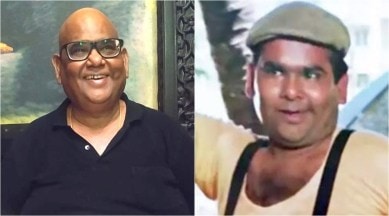Click here to follow Screen Digital on YouTube and stay updated with the latest from the world of cinema.

‘Hamara father north Indian, hamara mother south Indian, isliye hum complete Indian’. Saajan Chale Sasural, 1996
These dialogues, both from popular David Dhawan films, were delivered by the inimitable Satish Kaushik. They could easily have been put in the mouth of any of the large roster of comics who were part of Dhawan movies, starting with Govinda and going on to Kader Khan, Shakti Kapoor, Satish Shah, Johnny Lever and so on. But Kaushik brought to those corny lines a complete commitment to the broad comedy required to pull the corny lines off, as well as a smiley self-awareness of the genre, and that’s what made those lines memorable.
He died in Gurugram of a heart attack on Wednesday at 66.
As an alumnus of Delhi’s Kirori Mal College, which he joined to do theatre with its well-known group ‘The Players’, he went on to the National School of Drama (NSD), his dream was to become an actor. But ‘that boy from Karol Bagh who came to Mumbai’s maya nagri with 800 rupees in his pocket’, as he often described himself, became much more: dialogue writer, director, producer, all-round entertainer.
One of the first things he did was to sweet-talk himself into assisting Shekhar Kapoor in ‘Masoom’ (1983), learning a great deal about making a film while on set. He stayed with Kapoor for the Anil Kapoor-Sridevi blockbuster ‘Mr India’ (1987), in which he wrote himself the role of Calendar, the good-hearted buffoon, which also became one of his most popular parts.
Which was great, but the insistence of Hindi cinema to typecast actors ensured that he kept getting similar roles where he would be called by outlandish names– Pappu Pager remains unbeatable in that long list– and would have to deliver even more outlandish dialogues. But he was never one of the ‘comedy picture ke thakele joker log’ ( Double Dhamaal, 2011) that his dialogue dissed: he was part of that breed of comics who made things better, whose appearance on screen guaranteed light-hearted moments, many created by masterful dialogue writers like Kader Khan. He himself was no slouch when it came to writing dialogue: part of the loopy charm of Kundan Shah’s ‘Jaane Bhi Do Yaaro’ is down to his being the co-writer on the film.
But because laughter remained his best medicine, his ability to be much more versatile was first tapped by a film made in the West (Brick Lane, directed by Sarah Gavron, adapted from a novel of the same name by Monica Ali, 2007), in which he plays a London-based middle-aged man married to an unhappy much younger woman. I remember being struck by the sensitivity he brought to that complex role, and wondering when the Hindi film industry would give him parts with more heft.
What was strikingly different about Kaushik from those of the other popular comics that he worked with, that he managed to broad-base his slate very early on. From being assistant-director, he leapt straight into directing what was then the most expensive film in Bollywood, ‘Roop Ki Rani Choron Ka Raja’ (1993), also starring Anil-Sridevi, and produced by Boney Kapoor. That it became one of the most expensive duds in Bollywood history was balanced a whole decade later, when Kaushik directed Salman Khan’s ‘Tere Naam’ (2003), whose huge success gave the star a new lease of life in Bollywood.
In the last few years, with the proliferation of web series, Kaushik was finally getting the roles he deserved: the foul-mouthed moneybag Manu Mundra in Hansal Mehta’s ‘Scam 92’ was one such. It isn’t a big part, but the malice and the greed he brings to his character made it a stand-out. His recent turns in ‘Sharmaji Namkeen’, ‘Chhatriwali’, and ‘Thar’ were the best things about the films, all dramatically different from each other. You wonder if there would have many more such roles, where his versatility would have had a chance to shine.
The question now is sadly moot. But we will always remember the affable, likeable, twinkly-eyed Satish Kaushik who made us laugh out loud so many times over the years.
Click here to follow Screen Digital on YouTube and stay updated with the latest from the world of cinema.